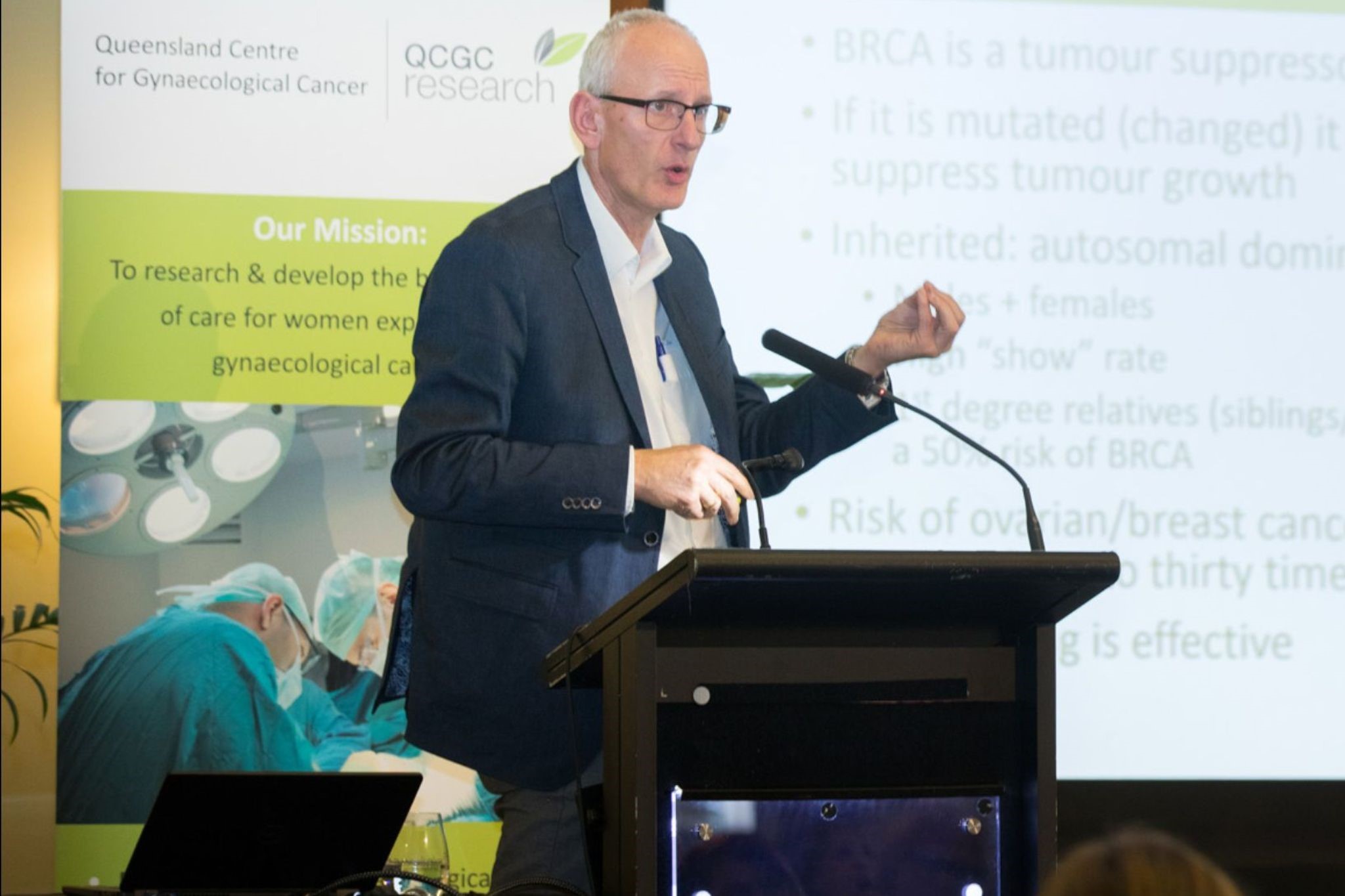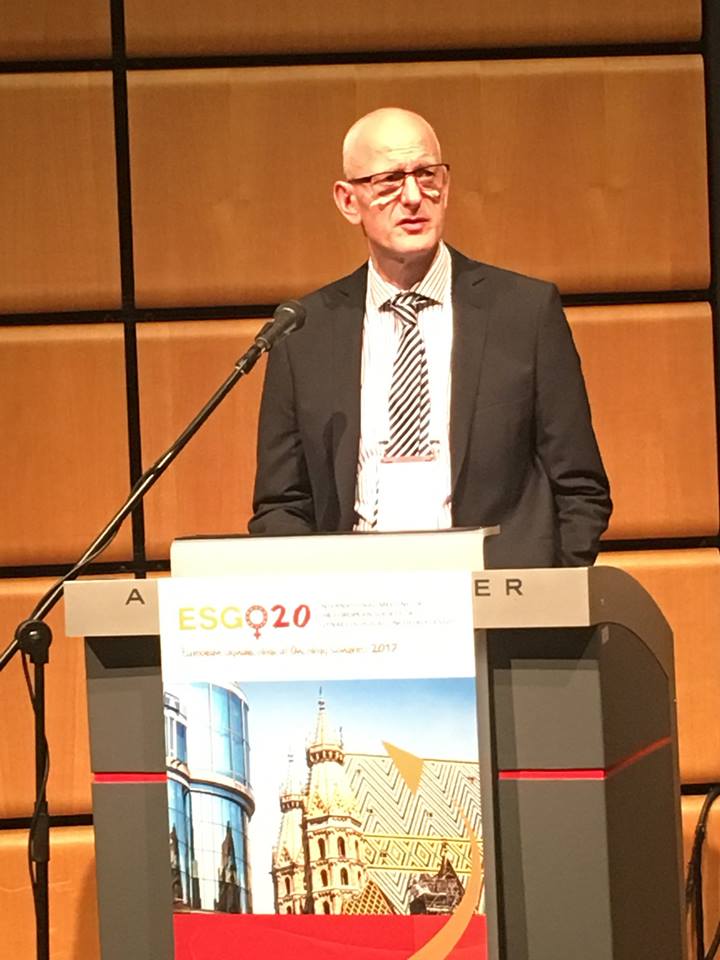Research Output
Research never happens in isolation. It draws on, inspires and informs other studies. We can see the growing international influence of our research in two ways - citations of our research output and invitations to speak at international conferences. For a complete listing of QCGC Research grants and publications visit Professor Obermair's UQ profile here.
Imagine Trial
Background:
The IMAGINE Trial was developed to test a model for training gynaecological surgeons in laparoscopic hysterectomy rather than traditional open abdominal surgery. This followed outcomes from previous QCGC Research studies that showed 40% of hysterectomies were performed with traditional open abdominal surgery (LACE Trial ) and that the main impediment to gynaecological surgeons changing their practice was a lack of training opportunities to gain the advanced surgical skills needed to conduct less-invasive keyhole hysterectomy (LIgHT Study). It was expected that once surgeons were equipped with skills to perform laparoscopic surgeries, better outcomes would be achieved for women and save costs to the health system. Read more on why the IMAGINE Trial was developed here.
Results:
Two IMAGINE trial papers have now been published - click on the links below:
feMMe Trial
In March 2021, QCGC Research Director, Professor Andreas Obermair, shared the findings of the feMMe trial to the world-wide gynaecological oncology community, at the Society of Gynecologic Oncology’s (SGO) Virtual Annual Meeting on Women’s Cancer .
The feMMe trial investigated whether women with endometrial cancer could be treated less invasively through the use of a common intra-uterine device to reduce the need for surgery and in some women, preserve their fertility. 165 women from 16 sites across Australia and New Zealand were enrolled in the study.
 The findings shared included:
The findings shared included:
- 82% of women with endometrial hyperplasia with atypia (a precursor to endometrial cancer) and 42% of women with endometrial cancer responded to the new non-invasive treatment;
- The new treatment was more successful when combined with weight loss (67% response rate); and
- Side effects from the new treatment were few and far between.
The results will benefit women around the world, diagnosed with endometrial hyperplasia with atypia or a well-differentiated endometrial cancer who have an unreasonably high risk of complications from endometrial cancer surgery; and younger women diagnosed with early stage cancer who wish to retain fertility to complete their families.
For further information on the trial read UQ’s article here: https://medicine.uq.edu.au/article/2021/03/iud-saving-fertility-women-cancer
Or read the full published article here: https://www.sciencedirect.com/science/article/pii/S0090825821000895
LACC Trial
This trial is a good example of QCGC Research's global influence. LACC is a worldwide trial aiming to determine the best surgical treatment option for women experiencing early stage cervical cancer via Minimally Invasive Surgery (laparoscopic (key-hole) or robotic radical hysterectomy) vs the traditional open-radical hysterectomy approach. 
In contrast with endometrial cancer, results of the 10-year LACC Trial, suggest that laparoscopic or robotic radical hysterectomy for cervical cancer is more likely to result in disease recurrence and reduced survival rates than open abdominal surgery.
As a result of this trial, NCCN Clinical Practice Guidelines in Oncology (NCCN Guidelines) for the treatment of cervical cancer has been revised to reflect the findings of this trial. NCCN Guidelines are widely recognised and used as the standard for clinical policy in oncology by clinicans worldwide.
In November 2018, our group published a paper in the New England Journal of Medicine comparing laparoscopic with open radical hysterectomy for early-stage cervical cancer.
- Minimally Invasive versus Abdominal Radical Hysterectomy for Cervical Cancer. Presented, in part, at the SGO Annual Meeting on Women's Cancer, New Orleans, USA, March 24-27, 2018. View the Initial Outcomes paper here.
- Incidence of adverse events in minimally invasive vs open radical hysterectomy in early cervical cancer: results of a randomized controlled trial. Presented, in part, at the 17th Biennial Meeting of the International Gynecologic Cancer Society (IGCS), Kyoto, Japan, September 14–16, 2018. View the Adverse Events Paper here.
- Quality of life in patients with cervical cancer after open versus minimally invasive radical hysterectomy (LACC): a secondary outcome of a multicentre, randomised, open-label, phase 3, non-inferiority trial. View the Quality of Life paper here.


LACE Trial
The LACE trial showed that total laparoscopic surgery had significant benefits for patients including lower rate of postoperative adverse events, shorter length of hospital stay, better quality of life as reported in Lancet Oncology and European Journal of Cancer. Cost-effectiveness analyses was reported in the BMJ, showed that a decision to invest in laparoscopic surgery was cost effective for health funders in 98% of the time. This clinical trial remains the world's most influential randomised study in the surgical treatment of endometrial cancer, and its results demonstrated that laparoscopic surgery should be the first line therapy, a result that has become embedded in national and international treatment guidelines (reach). This outcome had a major effect on the world-wide use of laparoscopic surgery for patients with endometrial cancer and is estimated to save the health care system $3000 for each operation that can be done laparoscopically since the results of the trial were published in JAMA in 2017.
Three examples of global influence for our publication:
- Effect of total laparoscopic hysterectomy vs total abdominal hysterectomy on disease-free survival among women with stage I endometrial cancer: a randomized clinical trial. Jama. 2017 Mar 28;317(12):1224-33. View the publication here.
- Uterine Neoplasms, Version 1.2018, NCCN clinical practice guidelines in oncology. Journal of the National Comprehensive Cancer Network. 2018 Feb 1;16(2):170-99. View the publication here.
- Endometrial carcinoma: pretreatment evaluation, staging, and surgical treatment. View the publication here.
- Toward Incorporating Health-Related Quality of Life as Coprimary End Points in Clinical Trials: Time to Achieve Clinical Important Differences and QoL Profiles. 10.1200/JCO.21.02750 Journal of Clinical Oncology. 2022 May 16. View the publication here.
LiGHT Trial
This study surveyed over 2300 women in Queensland who had a hysterectomy in the past. It was very interesting to find that 96% were happy they had the hysterectomy and only 4% reported they regretted the decision. Most women followed the advice of their doctor with regards to the type of hysterectomy suitable for them. Very few women sought a second opinion. Recovery was good for most women, with those receiving laparoscopic or vaginal hysterectomy reporting quicker recovery than those who had an open abdominal hysterectomy. These women took up to 6 months to recovery completely.
An example of global influence for our publication:
- Factors influencing women’s decision making in hysterectomy. Patient education and counseling. 2018 Mar 1;101(3):504-10. View the publication here.
Barriers to Uptake of Minimal Access Surgery in the United Kingdom. Office of Health Economics; 2018 Mar 1. View the publication here.
Invitations to speak at international conferences:
Most recently, Professor Obermair accepted invitations to speak at the following:
2020 (Due to COVID-19, these conferences were run virtually)
- Virtual Global Meeting of the International Gynecologic Cancer Society (IGCS), Sept 2020
- SGO Annual Meeting on Women's Cancer, Toronto, Canada (Mar 2020) Cancelled due to COVID-19 Pandemic
2019
- European Congress for the European Society of Gynaecological Oncology (ESGO) in Athens, Greece (Nov 2019)
- Global meeting of the International Gynecologic Cancer Society (IGCS) in Rio de Janeiro, Brazil (Sept 2019)
- SGO Annual Meeting on Women's Cancer in Hawaii, Honolulu (Mar 2019)
2018
- European Society for Medical Oncology (ESMO) in Munich and the European Society for Gynaecological Endoscopy (ESGE) in Vienna, Austria (Oct 2018)
- Biennial Meeting of the International Gynecologic Cancer Society (IGCS) in Kyoto, Japan (Sept 2018)
- Indonesian Society of Gynaecological Oncology (INASGO) Biennial Meeting in Labuan Bajo, Flores, Indonesia (Jul 2018)
- SGO Annual Meeting on Women's Cancer in New Orleans, USA (Mar 2018)
